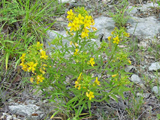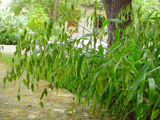Native Plants

Q. Who is Mr. Smarty Plants?
A: There are those who suspect Wildflower Center volunteers are the culpable and capable culprits. Yet, others think staff members play some, albeit small, role. You can torture us with your plant questions, but we will never reveal the Green Guru's secret identity.
Did you know you can access the Native Plant Information Network with your web-enabled smartphone?
Ask Mr. Smarty Plants is a free service provided by the staff and volunteers at the Lady Bird Johnson Wildflower Center.

rate this answer
Monday - August 25, 2008
From: Leander, TX
Region: Southwest
Topic: Deer Resistant
Title: Leguminous deer-resistant groundcover
Answered by: Nan Hampton
QUESTION:
Please help me identify a deer-resistant leguminous ground cover native to Central Texas to serve as a guard plant in edible-plant groupings.ANSWER:
You will find a list of Deer Resistant native plants, many of which are native to Central Texas, on our Recommended Species page. The following leguminous (Family Fabaceae) plants grow in Travis and Williamson Counties and could qualify as groundcovers when they are present. Most of them, however, do not persist after they have bloomed and set seed. If you want a persistent deer-resistant member of the Family Fabaceae to surround your edible plants, perhaps you could ring it with small Sophora secundiflora (Texas mountain-laurel) plants.
Dalea aurea (golden prairie clover)
Dalea frutescens (black prairie clover)
Lupinus texensis (Texas bluebonnet)
Senna lindheimeriana (velvet leaf senna)
Senna roemeriana (twoleaf senna)
There are many other non-leguminous choices. For example, deer rarely eat members of the Family Lamiaceae (mint family) and there are several attractive grasses as well that deer do not browse. Here are a few suggestions:
Salvia farinacea (mealycup sage)
Scutellaria wrightii (Wright's skullcap)
Chasmanthium latifolium (Inland sea oats)
From the Image Gallery
More Deer Resistant Questions
Perennial plants native to northeastern Pennsylvania
May 12, 2005 - What perennial plants are native to northeastern Pennsylvania?
view the full question and answer
Deer-resistant native ground cover for part sun in Lago Vista TX
May 01, 2010 - Looking for a ground cover in an area that gets partial sun, is level and good drainage. Area is 10' x 20'. Thought about Trachelospermun Asiaticum (Asiatic Jasmine) but what ever I go with it has t...
view the full question and answer
Flowering, deer resistant plants for South Carolina
March 21, 2010 - Can you tell me which flowering plants are deer resistant and will grow in South Carolina?
view the full question and answer
Deer-resistant groundcover for sunny hillside in California
November 17, 2009 - we are looking for a deer resistant, drought resistant ground cover that we can grow from seed. we have a large,partial sunny hillside, well drained,that is cover with oak leaves and pine needles..and...
view the full question and answer
Deer-resistant groundcover under pine trees
June 07, 2008 - what kind of ground covering can be planted under pine trees (acid soil) that the deer will not eat and will not attract bees?
view the full question and answer
| Support the Wildflower Center by Donating Online or Becoming a Member today. |


